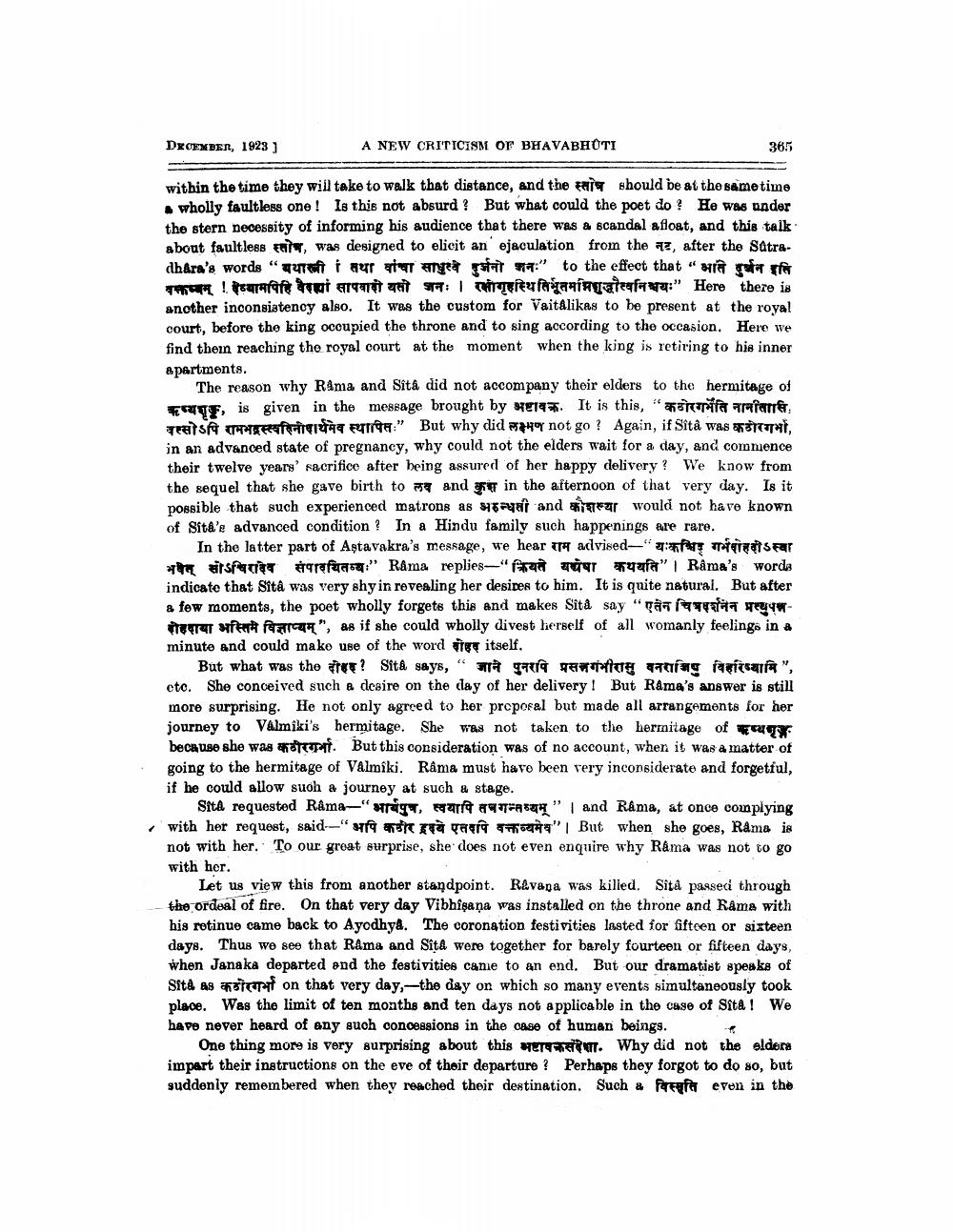________________
DECEMBER, 1923)
A NEW CRITICISM OF BHAVABHUTI
365
within the time they will take to walk that distance, and the mi should be at the same time
wholly faultless one! Is this not absurd? But what could the poet do! He was onder the stern necessity of informing his audience that there was a scandal afloat, and this talk. about faultless , was designed to elicit an ejaculation from the az, after the Satradhara's words "यथाली । सथा वांचा साधुत्वे दुर्जनो अनः" to the effect that “भात दुर्बन इति TUR I ETA hagi a t ht : I TATT fu fara hrattav" Here there is another inconsistency also. It was the custom for Vaitalikas to be present at the royal court, before the king occupied the throne and to sing according to the occasion. Here we find then reaching the royal court at the moment when the king is retiring to his inner apartments.
The reason why Rama and Sità did not accompany their elders to the hermitage of E TF, is given in the message brought by Ke19. It is this, "a rifa aratarie TASR Rufa FIT" But why did 29 not go ? Again, if Sità was OTTH in an advanced state of pregnancy, why could not the elders wait for a day, and comnience their twelve years' facrifice after being assured of her happy delivery? We know from the sequel that she gave birth to me and key in the afternoon of that very day. Is it possible that such experienced matrons as 94874t and o r would not have known of Sita'e advanced condition? In a Hindu family such happenings are rare. In the latter part of Aştavakra's message, we hear th advised "
teats Far rarsi refase;" Rama replies "GRŪG ufer" | Rama's words indicate that Sitê was very shy in revealing her desires to him. It is quite natural. But after a few moments, the poet wholly forgets this and makes Sitä say "pasaran peute MIT T P an", as if she could wholly divest herself of all womanly feelings in a minuto and could make use of the word tuy itself.
But what was the true? Sit& says, “ Sa Tag w o w farita ", etc. She conceived such a desire on the day of her delivery! But Rama's answer is still more surprising. He not only agreed to her preporal but made all arrangements for her journey to Valmiki's hermitage. She was not taken to the hermitage of our because she was tort. But this consideration was of no account, when it was a matter of going to the hermitage of Valmiki. Rama must have been very inconsiderate and forgetful, if he could allow such a journey at such a stage.
Site requested Rama-"arág, a TA3" | and Rama, at once complying with her request, said--"
à Targ T À " | But when she goes, Rama is not with her. To our great surprise, she does not even enquire why Ráma was not to go with her.
Let us view this from another standpoint. Revana was killed. Sità passed through the ordeal of fire. On that very day Vibhisana was installed on the throne and Rama with his rotinue came back to Ayodhya. The coronation festivities lasted for fifteen or sixteen days. Thus we see that Rama and Sita were together for barely fourteen or fifteen days, when Janaka departed and the festivities canie to an end. But our dramatist speaks of Site As it on that very day,--the day on which so many events simultaneously took place. Was the limit of ten months and ten days not applicable in the case of Sita! We have never heard of any such concessions in the case of human beings.
One thing more is very surprising about this wer u . Why did not the eldera impart their instructions on the eve of their departure? Perhaps they forgot to do so, but suddenly remembered when they reached their destination. Such a forefat even in the




